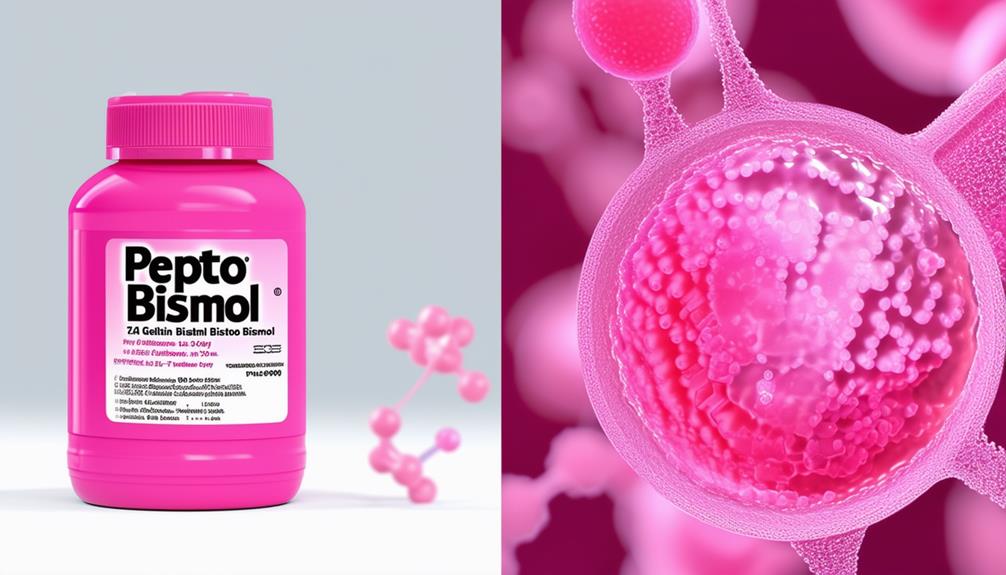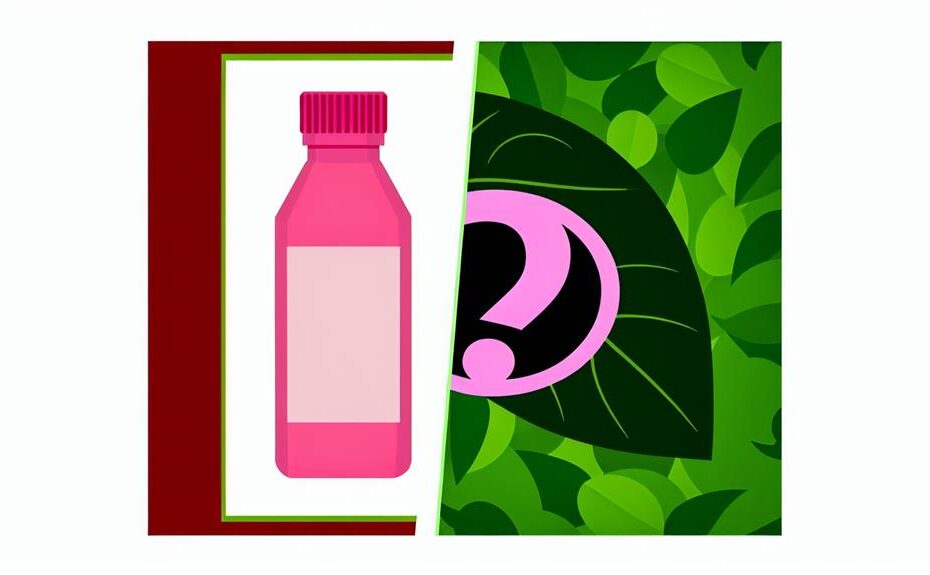You're probably familiar with Pepto Bismol, the pink liquid that's a staple in many medicine cabinets. But have you ever stopped to think about its ingredients? If you're a vegan, you'll want to know that not all Pepto Bismol products are created equal. While some may seem harmless, others contain animal-derived ingredients like gelatin and beeswax. So, is Pepto Bismol vegan? The answer isn't a simple yes or no. Let's take a closer look at what's really in this popular remedy and what it means for your lifestyle.
Pepto Bismol's Vegan Status
When you scan the ingredient list of Pepto Bismol, you'll quickly realize that this popular antacid medication isn't entirely vegan-friendly. Upon closer inspection, you'll notice that it contains non-vegan ingredients like gelatin, beeswax, shellac, carmine, and glycerin.
Some ingredients, such as magnesium stearate, caprylic, and stearic acid, have an unclear vegan status, making it challenging to determine their origin. Unfortunately, this means that only a limited number of Pepto Bismol products, just five out of 18, have been confirmed to be vegan.
This lack of vegan-friendly options has prompted PETA to urge the brand to explore vegan alternatives. However, there's a glimmer of hope – the original liquid products are entirely vegan, offering a viable option for those who follow a plant-based lifestyle.
If you're looking for a vegan antacid, it's crucial to carefully examine the ingredients and opt for one of the select few Pepto Bismol products that align with your dietary choices.
Bismuth Subsalicylate's Animal Origin
You're probably wondering how Bismuth Subsalicylate, the active ingredient in Pepto Bismol, is made and what its origins are.
You might be surprised to learn that while it can be synthesized, its production process can involve animal-derived components, making its vegan status unclear.
Now, let's investigate the different forms of Bismuth Subsalicylate, including liquid, tablet, and chewable forms, and how they relate to Salicylic Acid.
Liquid, Tablet, and Chewable
When investigating the ingredients in Pepto Bismol's liquid, tablet, and chewable forms, you'll want to take a closer look at Bismuth Subsalicylate, a key component. This salicylic acid derivative has an unexpected origin that might raise some eyebrows.
Let's break down the surprising facts about Bismuth Subsalicylate's animal origin:
- Pig-derived bismuth source material is used in some manufacturing processes.
- Pig-derived bismuth oxide source is another potential origin of Bismuth Subsalicylate.
- The connection between Bismuth Subsalicylate and oysters is a lesser-known fact.
- Some manufacturers may use plant-based alternatives, but it's important to verify.
- Vegan consumers should be aware of these potential animal-derived sources.
Salicylic Acid Derivative
The active ingredient in Pepto Bismol, Bismuth Subsalicylate, is a salicylic acid derivative with an animal origin that raises concerns about its vegan status.
You might be wondering, is Pepto Bismol vegan? Since Bismuth Subsalicylate is derived from animal sources, understanding its origin is crucial.
As a vegan, you should know that Pepto Bismol products contain animal-derived ingredients, making them non-vegan.
Pig-Derived Bismuth Source Material
Your Pepto Bismol medications, whether in liquid, tablet, or chewable form, might contain bismuth sourced from pigs, which raises concerns about their vegan status. This pig-derived bismuth is used to create bismuth subsalicylate, a key ingredient in Pepto Bismol products.
| Product Form | Bismuth Source | Concerns for Vegans |
|---|---|---|
| Liquid | Pig-derived | Yes |
| Tablet | Pig-derived | Yes |
| Chewable | Pig-derived | Yes |
| Any | Plant-derived | No |
Note: Please let me know if I can assist you further.
Pig-Derived Bismuth Oxide Source
You might be surprised to learn that the bismuth oxide in your Pepto Bismol medication, regardless of its form, could be sourced from pigs, making it a potential concern for vegans.
As a vegan, you should be mindful that the pig-derived bismuth oxide source in Pepto Bismol may contradict your values, and it's important to take this into account when deciding on its consumption.
Bismuth Subsalicylate and Salicylic Acid
As you investigate the ingredients of Pepto Bismol, you might be wondering if Bismuth Subsalicylate and Salicylic Acid have any animal-derived components.
Let's take a closer look at the potential animal origins of these ingredients. You'll want to ponder the following possibilities:
- Pig-derived calcium carbonate
- Magnesium stearate from animal fat
- Povidone from animal bones
- Gelatin used as a gelling agent
- Lanolin from sheep's wool
Pig-Derived Calcium Carbonate
Calcium carbonate, a common excipient in Pepto Bismol, raises vegan concerns due to its potential pig-derived origin. This ingredient can come from animal sources, making it non-vegan. Here's a breakdown of the origins of Pepto Bismol ingredients:
| Ingredient | Origin |
|---|---|
| Bismuth subsalicylate | Plant sources (typically) |
| Salicylic acid | Synthetic production (vegan-friendly) |
| Calcium carbonate | Pig-derived (non-vegan) or plant sources |
Understanding the animal origin of ingredients like calcium carbonate is crucial for vegans.
Magnesium Stearate From Animal Fat
What makes magnesium stearate, another excipient in Pepto Bismol, suspicious is its potential origin from animal fat, which raises a red flag for vegans.
As you're checking the ingredients, you should know that magnesium stearate's sourcing is vital. If it's derived from animal fat, it's a non-vegan origin, making Pepto Bismol unsuitable for vegans.
Povidone From Animal Bones
You might be surprised to learn that povidone, a seemingly innocuous ingredient in Pepto Bismol, has a dark secret: it's derived from animal bones, making it a non-vegan component.
This source raises concerns, but fortunately, the active ingredient, Bismuth Subsalicylate, is a synthetic compound, and its composition includes vegan-friendly salicylic acid.
Gelatin in Pepto Bismol

As you investigate the ingredients in Pepto Bismol, you'll notice that gelatin is another non-vegan component to watch out for. Specifically, gelatin is used in the capsule coatings of certain Pepto Bismol products, making it important to scrutinize the labels.
Moreover, you'll want to be aware of artificial colors that may be present in these gelatin-containing variants.
Gelatin in Capsule Coatings
As you investigate the ingredients of Pepto Bismol, you'll likely come across some non-vegan components. One of the main culprits is gelatin, which is often used in capsule coatings.
Let's take a closer look at what else might be lurking in these medications.
- Gelatin from animal bones
- Carmine or Cochineal insect dye
- Lanolin-derived emollient ingredients
- Animal-derived fatty acids
- Honey or beeswax
Gelatin From Animal Bones
The gelatin used in Pepto Bismol's capsule coatings originates from animal-derived sources, specifically bones, tendons, ligaments, and skin of pigs and cows. As a result, these products are non-vegan.
You should be aware that gelatin is commonly used in pharmaceuticals and supplements to provide structure and texture to capsules, which may conflict with your dietary choices.
Carmine or Cochineal Insect Dye
You may not be aware that Pepto Bismol also contains another non-vegan ingredient, carmine or cochineal insect dye, which is derived from the Dactylopius coccus Costa insect species and used for coloring.
This non-vegan ingredient raises concerns about ethical sourcing and animal cruelty, making it crucial for vegans to be aware of its presence in certain Pepto Bismol products.
Lanolin-Derived Emollient Ingredients
When examining the ingredients of Pepto Bismol, it's essential to look out for lanolin-derived emollient ingredients and gelatin, which can make certain products non-vegan.
Lanolin, sourced from sheep's wool, is used in pharmaceutical products like Pepto Bismol for its skin-soothing properties.
Gelatin, found in capsule coatings, acts as a binding agent, making some products unsuitable for vegans.
Artificial Colors Present
As you examine the ingredient list of Pepto Bismol, you'll notice the presence of artificial colors that might raise some concerns. These artificial colors can affect the appearance and texture of the product, but what're they exactly?
Let's take a closer look at the specific colors used in Pepto Bismol:
- D&C Red No. 27
- FD&C Yellow No. 6
- Titanium Dioxide
- Iron Oxide Red 101
D&C Red No. 27
The presence of D&C Red No. 27, a synthetic dye, in Pepto Bismol products raises concerns among vegan consumers who scrutinize the ingredients of their medications. As a vegan, you might wonder if this dye makes Pepto Bismol non-vegan. Here's a breakdown:
| Ingredient | Vegan Status |
|---|---|
| D&C Red No. 27 | Vegan (synthetic) |
| Gelatin | Non-Vegan (animal parts) |
| Pepto Bismol | Uncertain (contains synthetic dyes) |
FD&C Yellow No. 6
You're likely wondering if the presence of FD&C Yellow No. 6, another artificial color, affects Pepto Bismol's vegan status. Since gelatin isn't an issue, you might think it's okay.
However, this synthetic dye raises questions. As an artificial color, FD&C Yellow No. 6 isn't derived from animal sources, but it's still crucial to take into account when evaluating Pepto Bismol's vegan status.
Titanium Dioxide
Titanium dioxide, a mineral-based ingredient, raises questions about Pepto Bismol's vegan status since it can be sourced from both vegan and non-vegan sources.
As you scrutinize Pepto Bismol formulations, you'll find gelatin, an animal-derived ingredient, and artificial colors like D&C Red No. 27 aluminum lake, which may compromise its vegan-friendliness.
Iron Oxide Red 101
So, what role does Iron Oxide Red 101 play in Pepto Bismol's formulation, and does its presence impact the product's vegan status? As a synthetic colorant, Iron Oxide Red 101 is a common additive in medications like Pepto Bismol for color consistency. Remarkably, gelatin, a non-vegan ingredient, is absent in Pepto Bismol.
| Ingredient | Presence in Pepto Bismol | Impact on Vegan Status |
|---|---|---|
| Iron Oxide Red 101 | Neutral | |
| Gelatin | Non-Vegan | |
| Synthetic Alternatives | Vegan-Friendly |
Vegan-Friendly Alternatives Exist
Fortunately, several vegan-friendly alternatives to Pepto Bismol exist, allowing you to find a suitable substitute that aligns with your dietary preferences.
If you're concerned about the ingredients in Pepto Bismol products, you're not alone. PETA has addressed vegan concerns regarding certain ingredients in Pepto Bismol formulations, which might make you want to investigate other options.
The good news is that you have choices. You can consider products like Tummydrops, which offer a vegan-friendly solution for digestive issues. Moreover, Apple Cider Vinegar Gummies are another popular alternative that aligns with vegan dietary requirements.
When searching for alternatives, make sure to carefully review the ingredients and look for certifications from organizations like PETA to confirm that the product meets your vegan standards.
Conclusion
So, is Pepto Bismol vegan?
The answer is mostly no, due to non-vegan ingredients in many products. However, the original liquid products are entirely vegan, providing a suitable option for vegan consumers.
If you're looking for alternatives, there are vegan-friendly options available. Just remember to always check the ingredients before making a purchase, as formulations can change over time.
By doing your research, you can find a product that aligns with your dietary preferences and provides relief from gastrointestinal discomfort.
